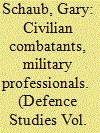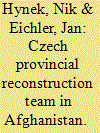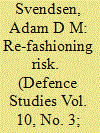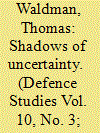|
|
|
Sort Order |
|
|
|
Items / Page
|
|
|
|
|
|
|
| Srl | Item |
| 1 |
ID:
099510


|
|
|
|
|
| Publication |
2010.
|
| Summary/Abstract |
States have increasingly replaced military personnel with armed civilian contractors. Are these civilians members of the military profession? I address this question in two ways. First, I assess whether armed contractors exhibit the characteristics of the profession of arms: expertise in the application and management of violence, provision of cost-effective solutions within the jurisdiction of warfare, legitimacy derived from the state and polity, and a recognized corporate identity. Then I assess the views of 260 elite American field grade officers. I find that armed contractors do share many of the characteristics of military professionals but that officers do not view the civilian contractors as military professionals, are uncomfortable with their intrusion into the profession of arms, and are cognizant of their negative effects but some ambivalence in their responses suggests that the boundaries of the profession of arms are being permeated by civilian contractors acting in combat roles.
|
|
|
|
|
|
|
|
|
|
|
|
|
|
|
|
| 2 |
ID:
099512


|
|
|
|
|
| Publication |
2010.
|
| Summary/Abstract |
This article is an empirical-theoretical mapping of the Czech participation in the peacebuilding reconstruction of Afghanistan in the form of the Czech Provincial Reconstruction Team (PRT). As will become clear, an important part of such a study is a focus on the analysis of the influence of the security context and external factors on the participation and form of the Czech PRT. The study is divided into two basic parts. The first part gives the reader a necessary and sensible grounding. Specifically, it presents a contextual frame for the participation of the North Atlantic Treaty Organization (NATO) in Afghanistan. What then follows is an analysis of the domestic political debate in the Czech Republic. One of the findings is that any proper domestic political debate was absent, instead there was a polarization of the relationship between the government of the Czech Republic and the parliamentary opposition on the issue of the Czech PRT Logar. The article concludes with a question concerning the motives of the Czech government for sending the Czech PRT into Afghanistan.
|
|
|
|
|
|
|
|
|
|
|
|
|
|
|
|
| 3 |
ID:
099511


|
|
|
|
|
| Publication |
2010.
|
| Summary/Abstract |
The following article examines how the principles of coercion theory can be applied towards the formulation of strategy aimed at countering terrorist financing. In doing so, this article provides a breakdown of coercion's relevant theoretical concepts on the subject matter. This is followed by an elaboration of the specific coercive approaches-non-military and military-that can be implemented to counter terrorist finance operations, along with an illustration, based on case-evidence, of how these approaches can be practically employed with power and policy mechanisms at the state and international levels. The article concludes with a discussion on what is required, from a coercion stand-point, to successfully counter a terrorist organization's financial operations, as well as the advantages and limitations involved in such a strategy.
|
|
|
|
|
|
|
|
|
|
|
|
|
|
|
|
| 4 |
ID:
099513


|
|
|
|
|
| Publication |
2010.
|
| Summary/Abstract |
Since the 1990s, the concept of strategic culture has (re-)gained scholarly attention in International Relations theory, offering a supplementary or alternative explanation for state behaviour. Using this concept as an analytical tool and drawing on International Relations theory, military history and organisational theory literature, this article examines the organisation of High Command in Britain and Germany between 1850 and 1945 from a comparative perspective. It demonstrates the explanatory power of strategic culture by identifying the enduring character of key attributes in the way both nations organised their strategic decision-making bodies and processes. With the next theatre of war unclear, Britain as an island nation preferred flexible and adoptable High Command structures in which the incontestable primacy of political control was key. On the contrary, the organisational choice of Germany was driven by its precarious geographical setting in the centre of the European continent and the idealisation of a personalised unification of political leadership and military command which contributed to the narrowed a-politicised, technical and operational focus of the German High Command.
|
|
|
|
|
|
|
|
|
|
|
|
|
|
|
|
| 5 |
ID:
099508


|
|
|
|
|
| Publication |
2010.
|
| Summary/Abstract |
his article explores the recent UK, US and Canadian security and intelligence efforts against terrorism. Contrasts can be readily drawn. Essentially the UK is engaged in both internal/domestic and external/international 'firefighting' against terrorism. Therefore, it has adopted a wide-ranging 'broad risk management' approach. Meanwhile the US is engaged mostly in external/international 'firefighting' against terrorism, conceived of as counter-insurgency in countries such as Iraq and Afghanistan. Washington has adopted a narrower 'risk prevention' approach. The Canadians, confronting a smaller threat, are less embroiled in 'firefighting' activities, enabling them to adopt more of a 'risk pre-emption' approach involving some social engineering. Arguably, the Canadian model outlined in this article can offer some instructive lessons for both the US and the UK.
|
|
|
|
|
|
|
|
|
|
|
|
|
|
|
|
| 6 |
ID:
099509


|
|
|
|
|
| Publication |
2010.
|
| Summary/Abstract |
The concept of chance has often been approached by military thinkers in either an unreasonably fatalistic or complacently dismissive manner. However, Carl von Clausewitz (1780-1831) developed a more accurate and realistic conception. For him, chance in war is an inescapable yet ambiguous phenomenon: it can create opportunities to be exploited or equally dash the best laid plans. Frequently disregarded in theory, Clausewitz maintained that chance, uncertainty, and friction are central to the nature of war, along with the human qualities required to overcome them such as courage, determination, and adaptability. Modern developments have not rendered these insights obsolete and, if anything, they hold even greater relevance to contemporary warfare. Western militaries fighting in Iraq and Afghanistan have been continually challenged by chance events and unforeseeable setbacks. Overconfidence bred by technological superiority has contributed to militaries inadequately capable of confronting unexpected developments in all of war's dimensions. Understanding Clausewitz's ideas can help prepare military leaders for the unpredictable in war.
|
|
|
|
|
|
|
|
|
|
|
|
|
|
|
|
|
|
|
|
|